

Mindful Listening to Enhance Your Life Performance. I am often asked this question: Why is it that guerrilla fighters, paramilitary leaders and gang members sit down with you and confess to you?
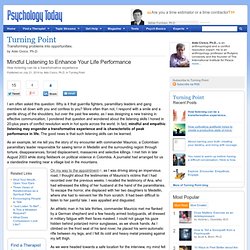
More often than not, I respond with a smile and a gentle shrug of the shoulders, but over the past few weeks, as I was designing a new training in effective communication, I pondered that question and wondered about the listening skills I honed in 20-plus years of conflict resolution work in hot spots across the world. In fact, mindful and empathic listening may engender a transformative experience and is characteristic of peak performance in life. The good news is that such listening skills can be learned. 5 Steps to Take Before Starting a New Relationship. 8 Reasons You Might Still Be Single. Mixed Signals. How well we understand ourselves has a profound impact on our ability to navigate the social realm.
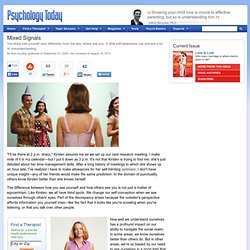
In some areas, we know ourselves better than others do. But in other areas, we're so biased by our need to see ourselves in a good light that we become strangers to ourselves. By soliciting feedback from other people, we can learn more about ourselves and how we're coming off. Only by understanding how we're seen can we make sure we're sending the right signals. Who Are You? (And What Do You Think of Me?) The New Hire: What Do I Need to Know About This Job Candidate—and How Can I Find It Out?

Every Sunday, America's corporate titans share their hiring strategies with . "I have a very good antenna about people," Starbucks founder Howard Schultz told the "Corner Office" column. Are You Misunderstood? Stop Trying to Fit In, Aim to Belong Instead. I confess that I haven't read Brene Brown's books yet, though I have seen the TED videos.
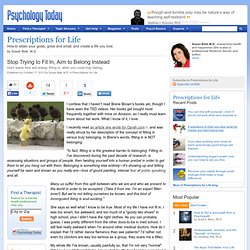
Her books get bought most frequently together with mine on Amazon, so I really must learn more about her work. What I know of it, I love. I recently read an article she wrote for Oprah.com, and was really struck by her description of the concept of fitting in versus truly belonging. In Brene's words, fitting in is NOT belonging: "In fact, fitting in is the greatest barrier to belonging. Many us suffer from this split between who we are and who we present to the world in order to be accepted, (Take it from me: I'm an expert fitter-inner!) She says so well what I know to be true. Enhancing worker well-being. In the 1980s, asbestos, solvents and pesticides were the most commonly cited topics in occupational health journals.
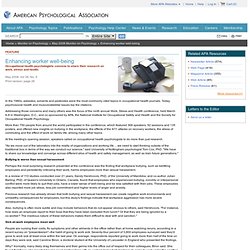
Today, psychosocial health and musculoskeletal issues top the citations. Addressing those concerns and many others was the focus of the ninth annual Work, Stress and Health conference, held March 6-8 in Washington, D.C., and co-sponsored by APA, the National Institute for Occupational Safety and Health and the Society for Occupational Health Psychology. More than 750 people from around the world participated in the conference, which featured 368 speakers, 92 sessions and 135 posters, and offered new insights on bullying in the workplace, the effects of the 9/11 attacks on recovery workers, the stress of commuting and the effect of work on family life, among many other topics.
At the meeting's opening session, speakers called on occupational health psychologists to do more than just research. Bullying is worse than sexual harassment Sick-at-work employees mean well Why? - J. Hidden Motives.
8 Reasons You Might Still Be Single. Signs of Counter-Dependency. A while back, the term “co-dependency” was all the rage.
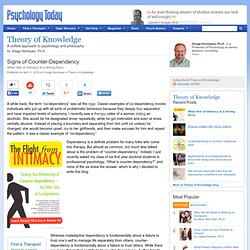
Classic examples of co-dependency involve individuals who put up with all sorts of problematic behaviors because they deeply fear separation and have impaired levels of autonomy. I recently saw a therapy video of a woman dating an alcoholic. She would be his designated driver repeatedly, while he got inebriated and even at times verbally abusive. Instead of placing a boundary and separating from him until (or unless) he changed, she would become upset, cry to her girlfriends, and then make excuses for him and repeat the pattern.
It was a classic example of “co-dependency.” Dependency is a definite problem for many folks who come into therapy. Whereas maladaptive dependency is fundamentally about a failure to trust one’s self to manage life separately from others, counter-dependency is fundamentally about a failure to trust others. The key in understanding counter-dependency is differentiating it from healthy autonomy. Do Codependents Make the Best or Worst Employees? By Neil J.
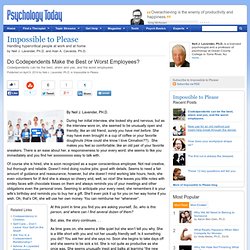
Lavender, PH.D. During her initial interview, she looked shy and nervous, but as the interview wore on, she seemed to be unusually open and friendly; like an old friend, surely you have met before. She may have even brought in a cup of coffee or your favorite doughnuts (How could she know I love Cinnabon??). She makes you feel so comfortable; like an old pair of your favorite sneakers. There is an ease about her, a responsiveness to your every word; she seems to like you immediately and you find her sooooooooo easy to talk with. Of course she is hired, she is soon recognized as a super conscientious employee.